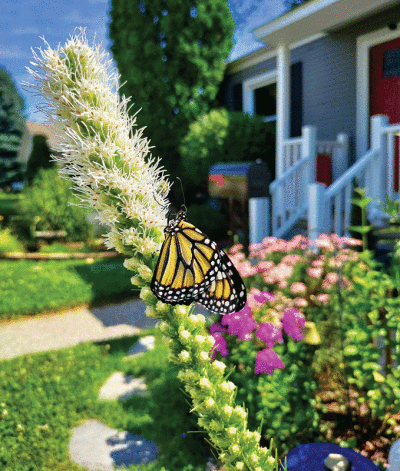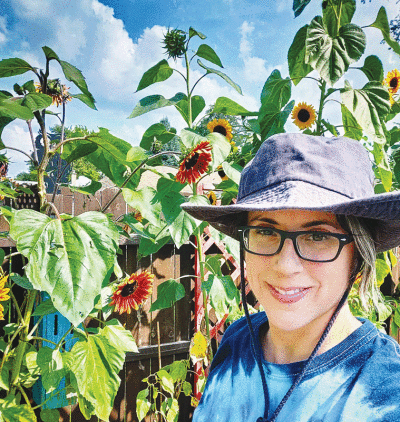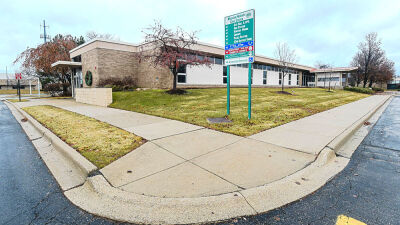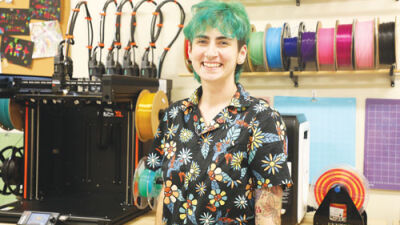
: A monarch butterfly rests on a white blazing star last year, in the native plant garden of Madison Heights resident Eve Sandoval.
Photo provided by Eve Sandoval

Sandoval, seen here tending to sunflowers in 2021, said native gardens require less water and no pesticides or herbicides, making them healthier for the environment.
Photo provided by Eve Sandoval
MADISON HEIGHTS — Grants are available for those interested in planting native gardens, which feature plants that provide food and habitat for pollinators and other beneficial species.
The garden grants are funded by the Bloom Project, a subcommittee of the Madison Heights Environmental Citizens Committee. Applications are available at madison-heights.org/1911/Garden-Grant-Program. The deadline is April 2, and the grants will be awarded April 24.
To qualify, the proposed garden must be located in Madison Heights. If the applicant is not the owner of the property, they must have written permission from the property owner. They must also plan to establish the garden during the 2023 growing season, and all plants or seeds purchased with the money must be native plants. Those with questions can email thebloomprojectmh@gmail.com.
The number of awards is not predetermined. Grants for homeowners will not exceed $400, and grants for schools and other organizations will not exceed $3,000.
Eve Sandoval is a Madison Heights resident who has been cultivating her own native gardens for years. She is also a former member of the Bloom Project who left due to scheduling conflicts.
“I love that they’re still pursuing this, and that the Bloom Project is continuing to move forward,” Sandoval said. “That makes me really happy.”
She said there are many benefits to the plants.
“Native plants have been around for so long — thousands, millions of years. They’ve adapted to our climate, our soils. The nice thing about them is they can be very drought tolerant because they use less water consumption. They prefer to grow in full sun, and they don’t like their feet wet, which is to say they don’t like their roots wet — they like to be dry, not overwatered. They also don’t require pesticides or herbicides; they’ll naturally repel invasive insects and plant species,” Sandoval said.
“I’ve seen it firsthand, how they create their own ecosystem. We would get aphid infestations on my common milkweed — they’re not a harmful insect, but they’re a nuisance that can take over — but then I see green lacewings showing up to take care of the aphid population. That’s just one example of how the native gardens start to balance themselves,” Sandoval said. “For me, I just find it fascinating how it unfolds like that. I didn’t have to spray anything.”
Sandoval said favorite native plants include common milkweed and swamp milkweed, which are a key food source for the caterpillars of monarch butterflies — long-distance pollinators distinctive for their orange-and-black wings. Between the two types of milkweed, she generally recommends swamp milkweed since it tends to stay where it’s planted.
Other recommended plants include red columbine, butterfly weed, black-eyed Susan, prairie blazing star, Joe Pye weed, wild bergamot, New England aster and purple coneflower. Some native shrubs include New Jersey tea, buttonbush and serviceberry.
“Start as small as you can. Even if you just want to put in a 3-foot-by-3-foot garden of just swamp milkweed, it makes a big difference. Even with just one plant, you’d be surprised how the butterflies can find that one plant,” Sandoval said. “I actually purchased a home here because I couldn’t wait to garden. I started really small, but it’s addictive, and also very therapeutic. You find yourself working outside more than you ever would, watching these flowers go from seedlings to beautiful plants with pops of colors. You start seeing more bees and butterflies, and fast-forward two years and you’re outside reading a book surrounded by flowers and bees dancing around you.
“And yeah, you will get more bees, but they won’t bother you,” she said. “They’re busy and they have a job. They won’t chase you. They just want to get their nectar. I also grow vegetables and I’m starting to grow fruits, and the pollinators help with them, too. A native garden can also be an artistic endeavor, as well as an educational one. It’s something I will never tire of — it will continue to stimulate my mind.”
In a joint statement by the ECC, members Nickole Fox and Coreen Porter spoke to the goal of the grants, as did Emily Rohrbach, the board’s City Council representative.
“I’m excited that the ECC continues to find ways to bring new native gardens to the city,” Rohrbach said. “Public spaces, private yards and school communities are all places where we can be intentional about creating space for native plants to thrive. Native plants and gardens bring innumerable benefits to our home ecosystem, our air, water and beneficial pollinators — all essential parts working to make Madison Heights a greener, more sustainable community.”
Porter said the program is a new initiative that aims to raise awareness.
“We recognize that native plant gardens — even small gardens — have a big impact in the lives of people and our environment. This program was created to broaden thinking about, and creation of, native plant gardens,” Porter said. “Native plant gardens are not only relevant, but indispensable; they are essential to us and all pollinators.”
Fox noted that the ECC will be offering a native plants workshop on May 3 from 6 p.m. to 7:30 p.m. at Madison Heights City Hall, 300 W. 13 Mile Road, so that residents, schools and other organizations can learn more about the basics of starting their own gardens.
In addition, the ECC will host a native plant sale on May 28 outside near City Hall. Both events are hosted in partnership with East Michigan Native Plants LLC.
“I’m excited that we’re able to bring these opportunities to our area. The plant sales have been well-attended, yet we know there are community members, organizations and schools that could use additional resources, whether it is more knowledge or funds to grow their gardens,” Fox said. “I’ve seen gardens bring people together, supporting a healthier community. That’s what excites me most.”
Mayor Roslyn Grafstein said the ECC raised funds for the grants with their own plant sales.
“They just want people to create gardens that are pollinator-friendly, helping with the bees and general habitat of the area,” she said.
Mark Bliss, the mayor pro tem, commended the ECC for their work.
“This is a great example of our staff and resident board working together to green the city and improve the environment,” he said. “The ECC has done a great job of leading this effort to bring native plants into our city, and also to replace our tree canopy and adopt other eco-friendly initiatives that don’t affect our annual operating budget.”
 Publication select ▼
Publication select ▼



















